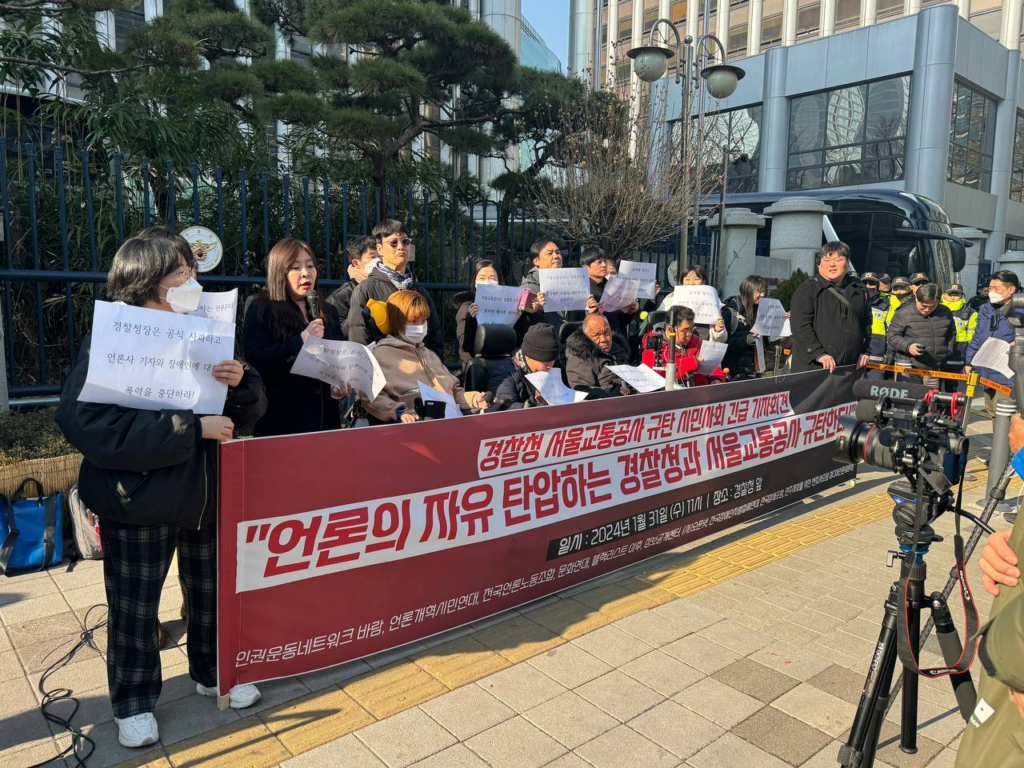
On January 31st, 204, 69 organizations in South Korea, including human rights and media groups, issued a joint condemnation statement and 10 human rights and media organizations jointly hosted a press conference titled “Condemning the National Police Agency and the Seoul Metro for suppressing freedom of Expression“.
On January 24th, the press conference regarding the ‘Efforts to withdraw the Dismissal and Restore Rights of Public Sector Workers focusing on Disability Discrimination’ hosted by the Disability Discrimination Act of Solidarity in Korea was abruptly canceled. This cancellation was the result of the aggressive eviction tactics employed by the Seoul Metro and the National Police Agency. Shockingly, not only were the attendees subjected to physical force, but reporters Redian and B-Minor, who were present to cover the event, were also forcefully removed from the scene. Even the reporter identified himself as a journalist after being asked for identification, the head of the Customer Safety Support Center of the Seoul Metro ordered the reporter to be pulled out, making an insulting remark, “What kind of reporter is this? Drag him out!” Subsequently, security personnel from the Seoul Metro and the National Police Agency grabbed the reporter’s body and forcibly dragged him from the place. The use of physical force against allies such as people with disabilities, human rights activists, and citizens has now extended to reporters.
The use of physical force against reporters by the Seoul Metro and the National Police Agency lacks any legal justification and was an absolute violation without due process. Employees of the Seoul Metro are not vested with public authority; they do not possess the mandate to employ physical force. In other words, individuals do not have the authority to use physical force. The Railroad Safety Act cannot stand above the basic constitutional rights of physical freedom, freedom of speech, and freedom of assembly. Additionally, the risk of applying physical force to an individual’s body must be clear. Mobilizing 10 times more security personnel during a peaceful press conference or propaganda campaign to use physical force on the reporter’s body and drag him or her away from the scene of the incident is an obstruction to reporting, a violation of freedom of the press, and a violation of personal freedom.
Despite this, the police either passively observed these illegal activities or actively participated in enforcing violent quarantine measures. This incident was not the first case of human rights violations against journalists. On January 22nd, during a press conference marking the 23rd anniversary of the ‘Oido Station lift fall disaster’ at the Hyehwa Station platform, journalists from B-Miner and Kyunghyang Shinmun who were covering the event were forcibly removed. Despite repeatedly identifying themselves as journalists and presenting their credentials, they were forcefully ejected. Furthermore, a director who was filming videos for people with disabilities was subjected to repeated violent expulsion.
We firmly contend that the suppression of journalists is a direct result of the Yoon Seok-yeol government’s persistent repression of freedom of assembly and expression. The National Police Agency’s failure to uphold fundamental laws and human rights standards creates an environment where entities like the Seoul Metro, a non-public authority, feel emboldened to engage in brazen acts of private violence.
We emphasize that resorting to physical force against journalists not only violates their human rights but also obstructs the representation of minority voices, including those of people with disabilities, in the media. Such infringements on freedom of speech carry profound negative implications. In our society, when only the voices of the powerful are heard, the voices of marginalized groups, such as social minorities, are silenced. This perpetuates deepening inequalities, discrimination, and animosity, ultimately undermining the fabric of democracy.
The Seoul Metro apologized to the journalists after it was reported in the media. The apology appears to be aimed at quelling the spread of critical public opinion. However, the lack of a concrete plan to prevent such incidents from recurring, coupled with ongoing suppression of the Disability Discrimination Act of Solidarity’s freedom of expression, leaves us skeptical of its sincerity. We refuse to accept apologies that serve to silence the media. Furthermore, the absence of an apology from the police chief is glaring. Considering the intensified crackdown on freedom of assembly and demonstration since May of last year, which has directly resulted in the suppression of reporters from various media outlets, it’s evident that ensuring freedom of the press will remain elusive without a proactive shift in the police’s approach to guaranteeing assembly and demonstration rights.
Our civil society will take all possible legal measures to secure freedom of assembly and expression, including suppression of freedom of speech, and will inform international human rights organizations, etc. we demand
- Even now, the Seoul Transportation Corporation must stop using physical force without legal basis and discipline the person responsible! Instead of making individual apologies, apologize officially and publicly and establish measures to prevent recurrence!
- The police chief should officially apologize, and the police should stop violence against media reporters and the disabled! Guarantee the right to assembly and demonstration and freedom of expression guaranteed by the Constitution and the Assembly and Demonstration Act!
- The Yoon Seok-yeol government must stop suppressing freedom of speech and expression!
January 31, 2024
69 organizations nationwide

![[Rightscon 2025 Taipei] SEACPN on Content Moderation](https://www.opennetkorea.org/wp-content/uploads/et_temp/Screen-Shot-2025-03-16-at-1.09.36-AM-218207_1080x550.png)
0 Comments